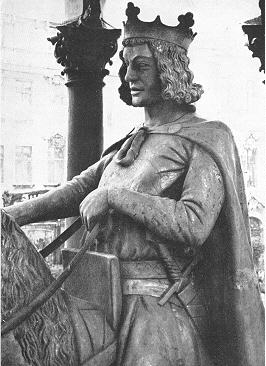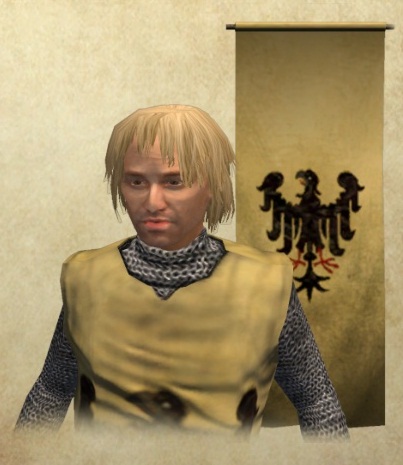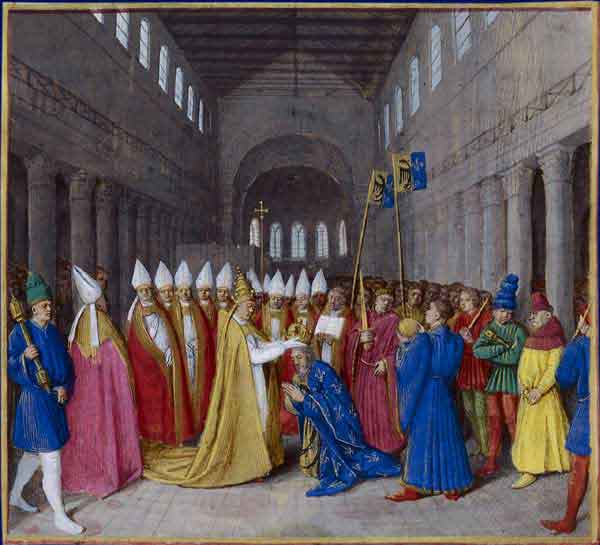STORY OF OTTO

=============
Otto I was crowned Emperor of the Romans by Pope John XII on February 2nd 962
THE ROMAN EMPIRE AND THE GERMAN KINGDOM
Otto the Great assumed in A.D. 962. But it was not his only office. He was already a German king; and the new dignity by no means superseded the old. This union in one person of two characters, a union at first personal, then official, and which became at last a fusion of the two into something different from either, is the key to the whole subsequent history of Germany and the Empire



 Of the German kingdom little need be said, since it differs in no essential respect from the other kingdoms of Western Europe as they stood in the tenth century. The five or six great tribes or tribe-leagues which composed the German nation had been first brought together under the sceptre of the Carolingians; and, though still retaining marks of their independent origin, were prevented from separating by community of speech and a common pride in the great Frankish Empire. When the line of Charles the Great ended in A.D. 911, by the death of Lewis the Child (son of Arnulf), Conrad, duke of the Franconians, and after him Henry (the Fowler), duke of the Saxons, was chosen to fill the vacant throne. By his vigorous yet conciliatory action, his upright character, his courage and good fortune in repelling the Hungarians
Of the German kingdom little need be said, since it differs in no essential respect from the other kingdoms of Western Europe as they stood in the tenth century. The five or six great tribes or tribe-leagues which composed the German nation had been first brought together under the sceptre of the Carolingians; and, though still retaining marks of their independent origin, were prevented from separating by community of speech and a common pride in the great Frankish Empire. When the line of Charles the Great ended in A.D. 911, by the death of Lewis the Child (son of Arnulf), Conrad, duke of the Franconians, and after him Henry (the Fowler), duke of the Saxons, was chosen to fill the vacant throne. By his vigorous yet conciliatory action, his upright character, his courage and good fortune in repelling the Hungariansthe middle of the tenth century, Germany, less fully committed than France to feudalism's worst feature, the hopeless bondage of the peasantry, was otherwise thoroughly feudalized. As for that equality of all the freeborn save the sacred line which we find in the Germany of Tacitus, there had been substituted a gradation of ranks and a concentration of power in the hands of a landholding caste, so had the monarch lost his ancient character as leader and judge of the people, to become the head of a tyrannical oligarchy. He was titular lord of the soil, could exact from his vassals service and aid in arms and money, could dispose of vacant fiefs, could at pleasure declare war or make peace. But all these rights he exercised far less as sovereign of the nation than as standing in a peculiar relation to the feudal tenants, a relation in its origin strictly personal, and whose prominence obscured the political duties of prince
It was natural that the great mass of Otto's subjects, to whom the imperial title, dimly associated with Rome and the Pope, sounded grander than the regal, without being known as otherwise different, should in thought and speech confound them. The sovereign and his ecclesiastical advisers, with far clearer views of the new office and of the mutual relation of the two, found it impossible to separate them in practice, and were glad to merge the lesser in the greater. For as lord of the world, Otto was Emperor north as well as south of the Alps. When he issued an edict, he claimed the obedience of his Teutonic subjects in both capacities; when as Emperor he led the armies of the gospel against the heathen, it was the standard of their feudal superior that his armed vassals followed; when he founded churches and appointed bishops, he acted partly as suzerain of feudal lands, partly as protector of the faith, charged to guide the Church in matters temporal. Thus the assumption of the imperial crown brought to Otto as its first result an apparent increase of domestic authority; it made his position by its historical associations more dignified, by its religious more hallowed; it raised him higher above his vassals and above other sovereigns; it enlarged his prerogative in ecclesiastical affairs, and by necessary consequence gave to ecclesiastics a more important place at court and in the administration of government than they had enjoyed before. Great as was the power of the bishops and abbots in all the feudal kingdoms,
The style which Otto adopted shewed his desire thus to merge the king in the Emperor
The monarch might desire to make good against his turbulent barons the boundless prerogative which he acquired with his new crown, but he lacked the power to do so; and they, disputing neither the supremacy of that crown nor his right to wear it, refused with good reason to let their own freedom be infringed upon by any act of which they had not been the authors. So far was Otto from embarking on so vain an enterprise, that his rule was even more direct and more personal than that of Charles had been. There was no scheme of mechanical government, no claim of absolutism; there was only the resolve to make the energetic assertion of the king's feudal rights subserve the further aims of the Emperor. What Otto demanded he demanded as Emperor, what he received he received as king; the singular result was that in Germany
The hapsburg monarchy
Maximilian II
Maximilian II was the first born son of Ferdinand I, Archduke of Austria and Anne of Bohemia and Hungary, the daughter of King Vladislaus II of Bohemia and Hungary and his third wife Anne of Foix-Candale. He and was born at Vienna on 31 July 1527 and was named in honour of his paternal great-grandfather, the Holy Roman Emperor Maximilian I, whose patrimony his father Ferdinand eventually inherited. 
FERDINAND I, archduke of Austria
dauhhter of King Vlasislaus of Bohemia
Maximilian was brought up at his father’s court at Innsbruck, he was provided with an excellent education, one of his tutors was the humanist scholar Wolgang Severus who much to the annoyance of his father, introduced him to the basics of the Lutheran religion. Maximilian grew to be a charismatic, open minded and outgoing individual who was gifted in linguistics, as well as his native German he spoke fluently in a further six languages, French, Spanish, Italian, Czech, Dutch and Magyar. He experienced warfare at the age of seventeen, when he took part in the Schmalkaldic War against his uncle Charles V’s nemesis, King Francis I of France
n September 1548, Maximilian was married at Valladolid in Spain to his first cousin Maria of Spain, daughter of Charles V, then Holy Roman Emperor and Isabella of Portugal. The bride was then twenty and the groom twenty one. The marriage was negotiated to strengthen ties between the Spanish and Austrian branches of the House of Habsburg, but in reality failed in this aim as Maximilian’s relationship with his uncle and father-in-law Charles deteriorated over the issue of his succession to the Austrian Habsburg domains, he was at first placed behind Charles’ son Philip which Ferdinand promptly raised objections to, as he himself had already been designated as the next Holy Roman Emperor.
(i) Anna of Austria (1 November 1549 – 26 October 1580) Married her uncle Philip II of Spain, and became the mother of Philip III of Spain
King Vlasislaus of Bohemia
xpedient against the land-holding oligarchy which Roman traditions as well as present needs might have suggested, it was scarcely possible for Otto to use. He could not invoke the friendship of the Third Estate, for as yet none existed. The Teutonic order of freemen, which two centuries earlier had formed the bulk of the population, was now fast disappearing, just as in England all who did not become thanes were classed as ceorls, and from ceorls sank for the most part, after the Conquest, into villeins. It was only in the Alpine valleys and along the shores of the ocean that free democratic communities maintained themselves. Town-life there was none, till Henry the Fowler forced his forest-loving people to dwell in fortresses that might repel the Hungarian invaders; and the burgher class thus beginning to form was too small to be a power in the state. But popular freedom, as it expired, bequeathed to the monarch such of its rights as could be saved from the grasp of the nobles; and the crown thus became what it has been wherever an aristocracy presses upon both, the ally, though as yet the tacit ally, of the people. More, too, than the royal could have done, did the imperial name invite the sympathy of the commons
After his coronation Otto had returned to North Italy, where the partizans of Berengar and his son Adalbert still maintained themselves in arms. Scarcely was he gone when the restless John the Twelfth, who found too late that in seeking an ally he had given himself a master, renounced his allegiance, opened negotiations with Berengar, and even scrupled not to send envoys pressing the heathen Magyars to invade Germany. The Emperor was soon informed of these plots, as well as of the flagitious life of the pontiff, a youth of twenty-five, the most profligate if not the most guilty of all who have worn the tiara. But he affected to despise them, saying, with a sort of unconscious irony, 'He is a boy, the example of good men may reform him.' When, however, Otto returned with a strong force, he found the city gates
Otto entering convoked a synod in St. Peter's. Himself presiding as temporal head of the Church, he began by inquiring into the character and manners of the Pope. At once a tempest of accusations burst forth from the assembled clergy. Liudprand, a credible although a hostile witness, gives us a long list of them:—'Peter, cardinal-priest, rose and witnessed that he had seen the Pope celebrate mass and not himself communicate. John, bishop of Narnia, and John, cardinal-deacon, declared that they had seen him ordain a deacon in a stable, neglecting the proper formalities. They said further that he had defiled by shameless acts of vice the pontifical palace; that he had openly diverted himself with hunting; had put out the eyes of his spiritual father Benedict; had set fire to houses; had girt himself with a sword, and put on a helmet and hauberk. All present, laymen as well as priests, cried out that he had drunk to the devil's health; that in throwing the dice he had invoked the help of Jupiter, Venus, and other demons; that he had celebrated matins at uncanonical hours, and had not fortified himself by making the sign of the cross. After these things the Emperor, who could not speak Latin, since the Romans could not understand his native, that is to say, the Saxon tongue, bade Liudprand bishop of Cremona interpret for him, and adjured the council to declare whether the charges they had brought were true, or sprang only of malice and envy. Then all the clergy and people cried with a loud voice, 'If John the Pope 136hath not committed all the crimes which Benedict the deacon hath read over
The lofty claims which Otto acquired with the Roman crown urged him to resume the plans of foreign conquest which had lain neglected since the days of Charles: the growing vigour of the Teutonic people, now definitely separating themselves from surrounding races (this is the era of the Marks— Brandenburg, Meissen, Schleswig), placed in his hands a force to execute those plans
Otto's conquests to the North and East approved him a worthy successor of the first Emperor. He penetrated far into Jutland, annexed Schleswig, made Harold the Blue-toothed his vassal. The Slavic tribes were obliged to submit, to follow the German host in war, to allow the free preaching of the Gospel in their borders. The Hungarians he forced to forsake their nomad life, and delivered Europe from the fear of Asiatic invasions by strengthening the frontier of Austria. Over more distant lands, Spain and England, it was not possible to recover the commanding position of Charles. Henry, as head of the Saxon


Walang komento:
Mag-post ng isang Komento